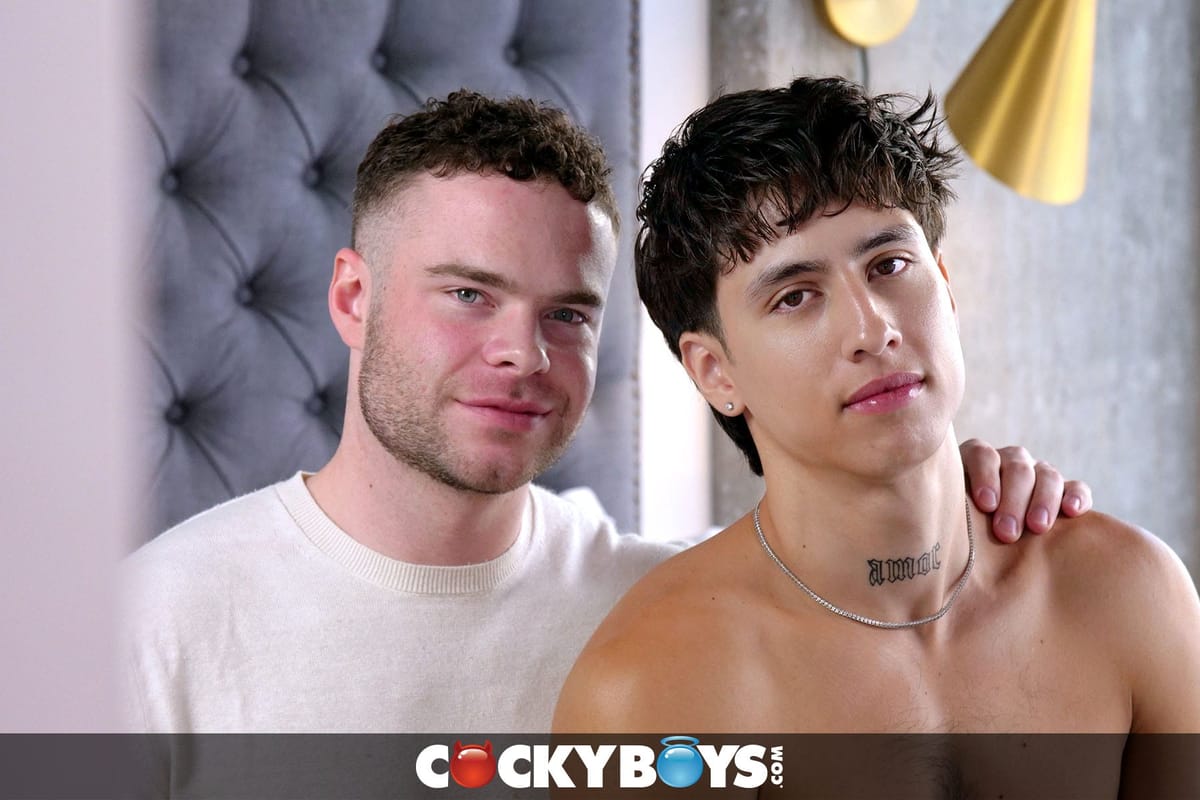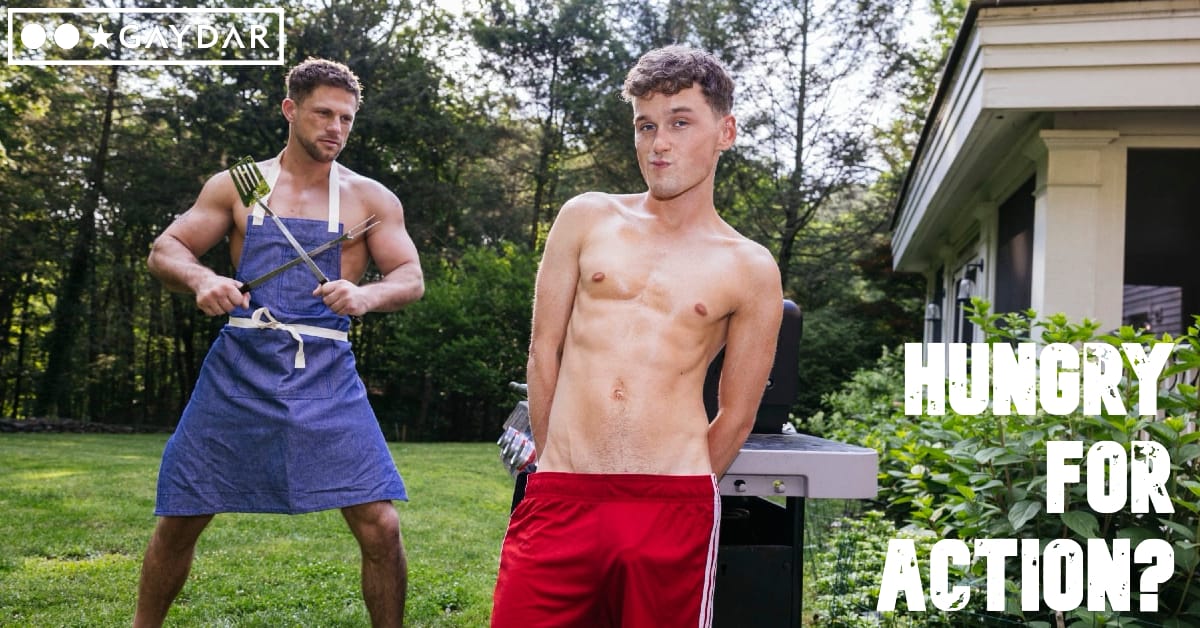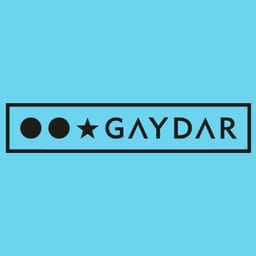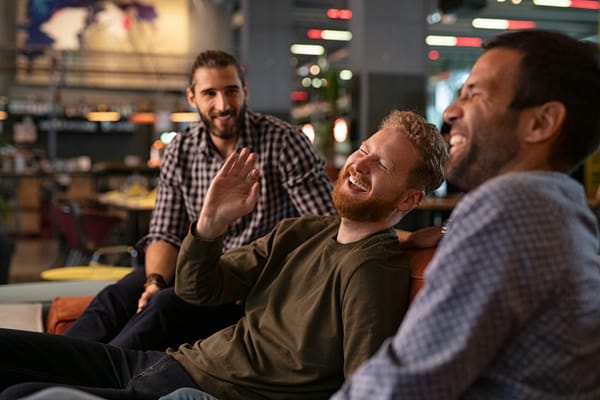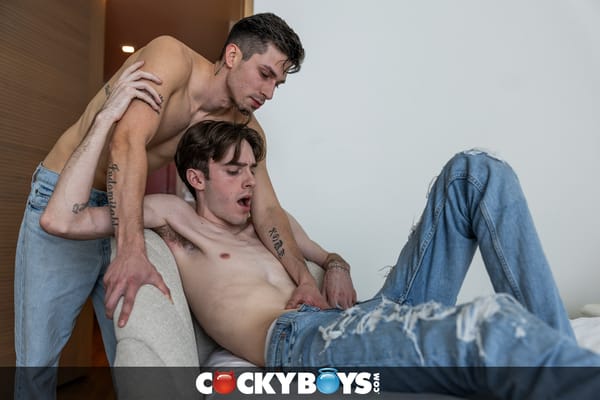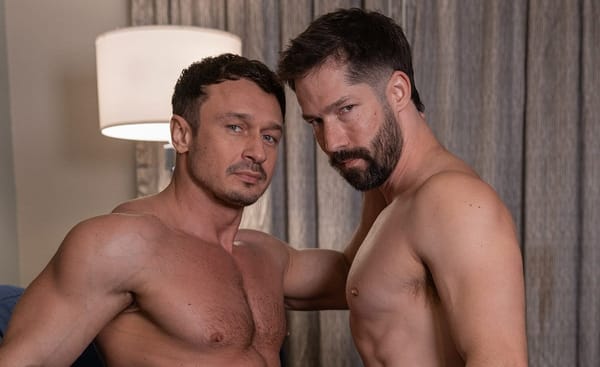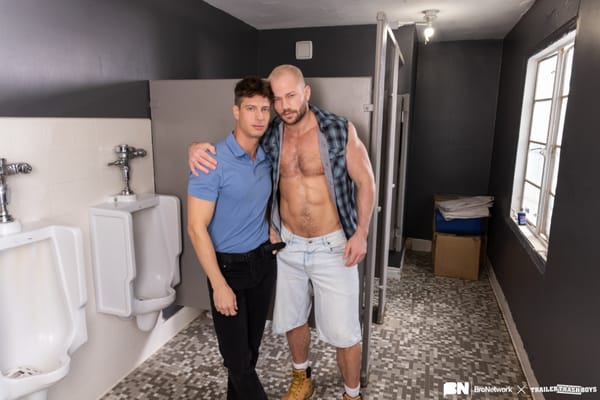Simon Haines: The interview
We catch up with the actor and filmmaker for a behind-the-scenes look at his on-screen life.
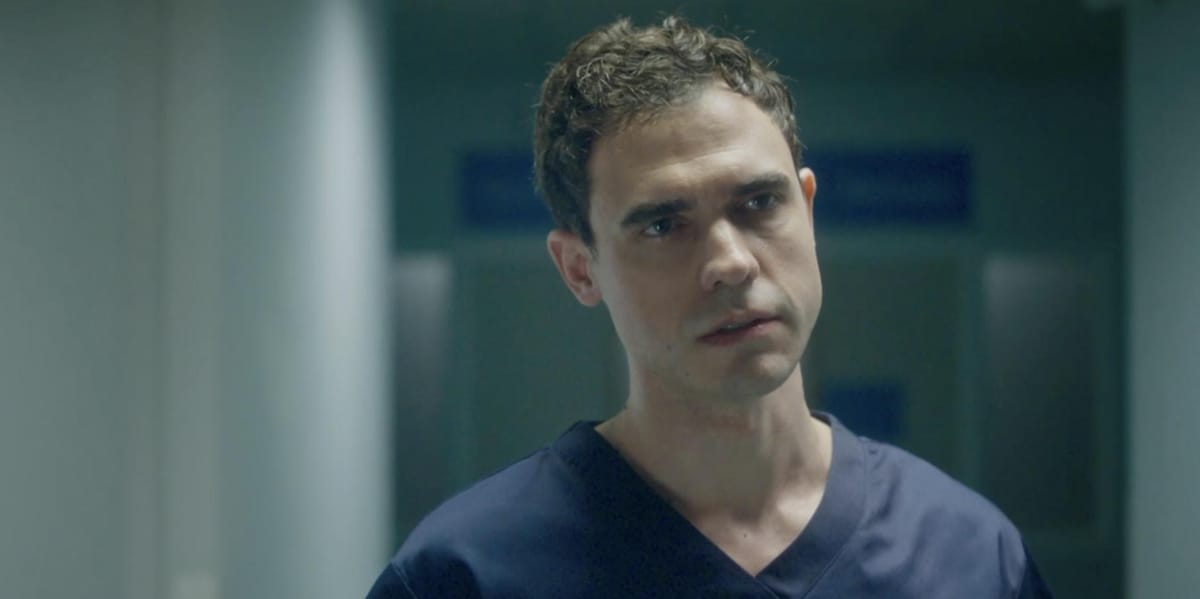
Simon Haines is an actor and filmmaker. Current roles include The Rings of Power, and The Running Man.
For our podcast, How To Date Men, we caught up with Simon for a behind-the-scenes look at his on-screen life.
In the conversation, we talk about Tolkien rabbit-holes, the power of representation, and his insights into the profession of acting.
When did you start to get a taste for acting as the career path that you wanted to pursue?
I guess it was in primary school, just messing around. I remember doing silly voices and stuff in front of the class where I was doing an impression of the Queen, but I was just ripping off like what I'd seen on The Simpsons and stuff like that. I used to come to show and tell - people would bring some rock that they found on holiday or whatever - I'd just come dressed as a witch and I would basically do sort of character stand up. I kept doing this week after week and they eventually said, this isn't show and tell anymore - you have to bring something. So I guess I just had to find a place for that.
What do you think prompted that need to perform in you? Was that something that your family was really encouraging or was it the feedback you were getting, the validation from people laughing at what you were doing?
I'm sure it was the feedback and the and the fun and the joy of it.
At times in my childhood, I was relatively shy and more introvert. So I think that was probably part of it - navigating being a teenager and finding it harder to express yourself. And I'm sure being Bi was probably part of it, too. I mean, I didn't even realise that I was Bi because that label as far as I knew didn't really exist. I was like, well, I guess I must be gay because I'm attracted to these boys. So I think probably that thing of needing to find some way that I could come out - not in the literal sense - but just express myself and be out there and be this is who I am.
In a safe kind of way? Like this isn't really me, it's the performance me?
Yeah, part of me is being hidden, but then I guess I just sort of show another part of me. So I think that was the initial impulse of it. It's very different now. Now it's just a really fun job.
You've worked extensively across television film and stage, but getting cast in Rings of Power and being part of such a huge production must have felt like a bit of a game changer for you?
It was amazing. That was one of the coolest phone calls I've ever received.
The night before I got the call, I was at a Lord of the Rings themed quiz in Brixton, - I was in full wizard outfit, the white wig, the beard, everything, and my mates were in their little elf ears.
I had gone up for something in Rings of Power months earlier and nothing had come of that. I was saying to my mates at that quiz, you know, I guess I didn't get it but it was cool to be considered for it.
Then, the next day, I got a phone call out of the blue - straight offer for three episodes.
You were going to Lord of the Ring quizzes, but were you a bit of a super-fan before the show? Or did you feel you had to get up to speed with the nuances of what this world was about?
I felt both. I read the books every couple of years, and I listen to the audio books. I'd read the Silmarillion in 2020, during lockdown. I'd already started my real geeky audiobook fetish - there are these books called things like Unfinished Tales and it's academic sort of books where you'll hear Tolkien's draft version of one story, and then you'll hear the next draft of the story, and then you'll hear some other fragment. And there's also someone reading the academic notes. It's a real rabbit-hole.
So I was already doing that, and then I got the job and I was like, right, I need to reread these books. It's not really too much of a spoiler to say that there's a siege in the second series, the siege of Eregion. And there's another siege in Tolkien lore, the siege of Gondolin, the fall of Gondolin. I was even re-listening to bits of it on set to get myself into character.
I took it all very, very seriously and did a lot of deep research which may or may not be present on screen.
A project that's in the post-production pipeline is the remake of the Running Man. Is that something that you're able to talk about at all?
The fact that I'm in the trailer means that I can say that I'm in it. And I got to work with Glenn Powell, who was super-cool. He a really lovely guy - very, very committed. He really committed to making this film the best thing it could possibly be. He was very warm, we'd run lines together, he was super-encouraging, knowing that I was coming on to this thing, which was really his baby.
Edgar Wright is the director, he did Shaun of the Dead and Hot Fuzz.
Seeing the trailer was a really awesome moment because when you're in it, you just see a part of it and you don't see everything that's going on, so it was great to see how visually stylish and fun it is. I'm really excited to see it.
It's a remake - were you familiar with the original?
I started watching the Arnie version just before my audition and I had to switch it off because I'm a bit of a wuss and it was just getting too violent. I was like, this is not good for my nervous system. But luckily Edgar's version is based on the original book, which is by Stephen King under a pseudonym. It's much more faithful to the original book. The Arnie version sort of takes it and runs with it - no pun intended - in a different direction.
As well as an actor, you're also a filmmaker. You've talked about wanting to bring the stories of bisexual and neurodiverse people to the screen. Why is that important to you?
It's very easy to feel alone. If you're not in the dominant majority of society, it's easy to feel alone.
I grew up in a small town and I knew one gay human, and they weren't even that openly gay. This was back in the 90s. The world is different now in a lot of places. But of course, there's a lot of places around the world where films are being edited to remove gay kisses.
So for me, it's super-important to just be out and visible. I didn't really have the label that would have really helped me when I was a kid to sort of just understand a bit more of like, that's me, that's who I am. And that's okay.
In every interview he does, Ian McKellen, manages to say: "Well, I'm gay." So I guess for me, it's like, well, I'm Bi. I know there's a lot of Bi men out there, and many of them are not out. Many of them are. But I think there's a real lack of openly Bi guys in the media. Women are doing much better with that, which is great. Saying the word "normalise" feels awful because for me it is super-normal. But there is still so much stigma around it for some people. And I just think one of the best things that you can do is just be who you are, be out there, and people can just come to see it as something as normal as it is.
In that context, in your approach to storytelling, are you making work for your younger self?
I definitely think about the next generation and wanting them to have it easier. Something like Heartstopper was really amazing for that - it was moving even for me, watching it as an adult.
I was working with a writer a couple of years back on a story and there wasn't a lot of diversity in it, even in terms of gender. And she was a woman. And I was like, why does this chef have to be a guy? Why can't it be a woman? Why can't it be a woman of color? Then there were these two mates in the thing. And I was like, why can't they be together? And then there was a thing of he was the ex of her. And I was like, so he's Bi, why not? So, you know, I'm sort of starting to hopefully move the needle towards it.
I recently auditioned for my first Bi character. I've been in this business for 11 years now - it's the first time I've auditioned for an openly Bi character. It was for a role in Midsummer Murders. The more popular shows like that, and the soaps, they really can push things forward. I was just part of a storyline in Emmerdale where the character that I was playing opposite - I was just coming in as a sort of impact villain character - but the guy I was initially there as a love interest for was Bi. That's out there getting three million views a week or whatever Emmerdale gets now. And I do think those sorts of things shift the needle.
How did it feel doing that first audition for a Bi character? Was that a little bit too close to home, in a way? If you think back to your early performing, acting was a way of projecting a different aspect of you, but this was actually "be a bit more like you" kind of thing?
I think for me, over the years, it's been just about truth and just being authentic and being natural and really not trying to fake stuff. I sort of hate having to fake stuff as an actor, which sounds like a contradiction, right? But I do think there's a way that you can feel like you're doing something that feels real. I'm always more interested in that.
For this Bi character, the only thing that I was aware of was, like, I wonder if they want a stereotype. I wonder if they want me to be real or was their idea for this Bi character to be somewhat camp - which of course is many people's reality, but it isn't everyone's reality. And I was like, I'm not really going to do that because that's not really who I am. So I just was like, I'm just going do this as me, and if that's what they want, great. And if that's not what they want, great. Someone else who's Bi, hopefully, will be playing the role. And it wasn't what they wanted.
But the main thing was that just being up for it was super-moving, and I'm sure they've cast someone else who's queer and he's going do an amazing job with it. And I'm looking forward to seeing it.
Rejection is such an inherent part of the industry. Do you get a lot of aspiring actors asking for your advice and guidance on how to navigate the industry? What do you tell them?
Yeah, I do. Practice, I think, is the number one thing. This is a skill. If you want to grow a muscle, go to the gym, take action.
And get out of your own way as best as you can. I think for the first few years of my career, I was really self-sabotaging myself. I've had a lot of therapy - which has been just amazing and life changing - and that ability to manage your mind, to shift your mindset and reframe things really helps.
A lot of people love this word "industry" - like you're working in a factory or a coal mine or something - it's dehumanising in some way. I think about it as the profession, which just feels more cool - I'm a professional.
Even the word rejection is not really one that I connect with. I mean, I've been on the other side of things - I direct, I've helped cast things. I know that it's never like, him, not her, not them. It's just, well, who's right for this time? And there can be amazing performers who do incredible additions and we're like, you know what? Because of what happened with the first season, we want to favour this particular characteristic in a person that we're bringing on board or even just that he looks a lot like the guy that he's meant to be the brother of, so he's going to tell the story better.
What's on the vision board for Simon Haines? What are some of your goals and aspirations for the months ahead?
I'd love to do a Mike Leigh film. I love improvisation.
There's a quote from the swimmer, Michael Gunning. He said something like, it turns out that I get to be the representation that I needed to see. So, that's definitely part of it - more queer stories. I want to just keep telling more queer stories.
The NSFW edition
If you want to admire some man-on-man action, our NSFW edition gives you every inch.
Sign in and check out our NSFW content - it's free!
